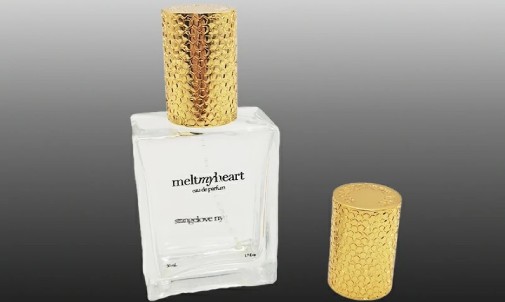Introduction
The fitting perfume bottle cap is crucial for maintaining product integrity and aesthetic appeal. Among the myriad considerations, one of the most critical factors is the material used for the cap. This article explores various materials commonly used in perfume caps, focusing mainly on their corrosion resistance. Whether you’re a perfume cap supplier or a brand looking for custom perfume cap solutions, understanding these materials will help you make informed decisions.

Types of Perfume Bottle Cap Materials
Regarding perfume bottle cap materials, manufacturers offer a range of options, each with unique characteristics and benefits. Here’s a breakdown:
Metal Cap Materials
- Stainless Steel
- Benefits: High durability, corrosion resistance, suitable for luxury perfumes.
- Limitations: It may require maintenance to prevent tarnishing.
- Maintenance Tips: Regular polishing with a soft cloth and non-abrasive cleaner.
- Aluminum
- Corrosion Resistance: Good corrosion resistance and lightweight.
- Suitability: Ideal for mass-market perfumes, cost-effective solution.
- Considerations: Anodized aluminum provides enhanced protection against corrosion.
- Brass
- Durability: Strong and durable, it offers a classic look.
- Aesthetic Appeal: Brass caps often feature intricate designs.
- Corrosion Vulnerabilities: Prone to tarnishing over time, especially in humid conditions.
- Zamac (Zinc Alloy)
- Characteristics: Combination of zinc, aluminum, magnesium, and copper.
- Advantages: Excellent corrosion resistance, allows intricate detailing.
- Applications: Popular choice for custom-designed perfume caps due to its versatility.
These materials offer varying corrosion resistance and aesthetic appeal, catering to different market segments and perfume formulations.
Understanding Corrosion in Perfume Bottle Caps
Corrosion in perfume bottle caps refers to the gradual deterioration of the material due to chemical reactions with its environment. Factors such as moisture, exposure to perfume ingredients, and atmospheric conditions can accelerate this process. Understanding the nature of corrosion helps select the most suitable material for perfume caps.
Factors Influencing Corrosion:
- Moisture: High humidity levels can promote corrosion, especially for metals like brass and steel.
- Perfume Ingredients: Some perfumes contain alcohol or acidic components that can rust certain materials over time.
- Atmospheric Conditions: Pollution and airborne chemicals can react with cap materials, affecting their longevity.
Corrosion Resistance of Different Materials:
Metal Caps
- Stainless Steel: Known for its corrosion resistance, stainless steel is an excellent choice for high-end perfumes that require durability and a sleek finish.
- Aluminum: Offers good corrosion resistance and is lightweight, making it suitable for everyday perfumes with moderate pricing.
- Brass: While durable and aesthetically pleasing, brass may require occasional polishing to maintain its appearance and resist corrosion.
- Zamac (Zinc Alloy): Combines durability with corrosion resistance, making it a versatile option for custom perfume cap designs that require intricate detailing.
Plastic Caps
- Polypropylene: Resistant to various chemicals and inexpensive, but may not offer the same aesthetic appeal as metal caps.
- Acrylic: Provides a wide range of design possibilities and is corrosion-resistant, although it can scratch more easily than metals.
- ABS (Acrylonitrile Butadiene Styrene): Offers a balance between strength and aesthetics, suitable for mass-market and niche perfumes.
- POM (Polyoxymethylene): Known for its mechanical properties and chemical resistance, POM is ideal for specialized perfume formulations.
Choosing the Right Material for Your Perfume
Selecting the optimal perfume bottle cap material involves evaluating several critical factors beyond corrosion resistance. Here’s a comprehensive guide to help you make an informed decision:
1.Perfume Formulation Compatibility
Consider the ingredients in your perfume formulation. If your perfume contains alcohol or other potentially corrosive components, opting for materials like stainless steel or Zamac would be prudent due to their robust corrosion resistance properties. These materials ensure that your perfume cap remains intact and aesthetically pleasing over time.
2.Brand Aesthetic and Design Requirements
The choice of perfume cap material significantly impacts your product’s overall look and feel. For luxury brands, stainless steel or brass caps offer a premium appearance that aligns with high-end packaging. On the other hand, plastic caps such as acrylic or ABS can provide versatility in design, allowing for innovative shapes and colors to match your brand identity.
3.Durability and Longevity
Evaluate the durability of the material under various conditions. Stainless steel and Zamac are known for their durability and resistance to wear and tear, making them suitable for long-term use. Conversely, plastic caps like polypropylene and acrylic, while less prone to corrosion, may require more frequent replacement or maintenance in harsh environments.
4.Budget Considerations
Cost-effectiveness is another crucial factor. Aluminum and certain plastics, like ABS, are more affordable than stainless steel or brass. They offer good corrosion resistance for everyday perfumes without compromising on quality.
5.Practical Tips for Maintenance:
- Regular Cleaning: Regardless of the material chosen, regular cleaning and maintenance help prolong the lifespan of perfume bottle caps. Use gentle cleaners and soft cloths to remove dust and buildup.
- Storage Conditions: Store perfumes in a cool, dry place away from direct sunlight to prevent accelerated degradation of the cap material.
Conclusion
Choosing the suitable perfume bottle cap material involves balancing functional requirements with aesthetic preferences and budget considerations. By understanding the properties and benefits of different materials, such as stainless steel, aluminum, brass, Zamac, and various plastics, you can confidently select a custom perfume cap that enhances your product’s appeal and longevity.
